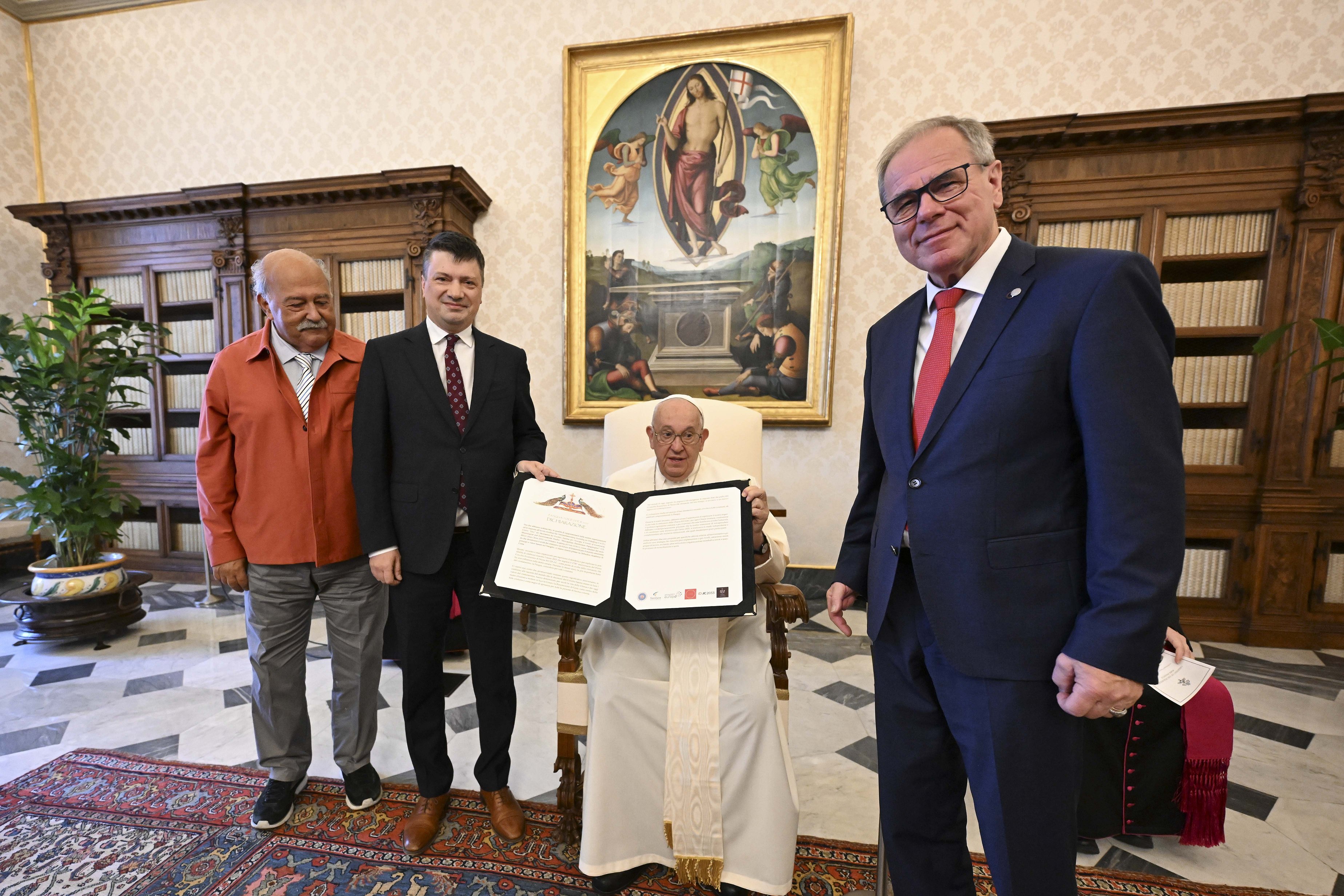Pope encourages ecumenical efforts to find common date for Easter
September 20, 2024 at 11:13 a.m.

VATICAN CITY CNS – Easter belongs to Christ, not to people deciding where it falls on a calendar, Pope Francis said.
"Easter does not take place by our own initiative or by one calendar or another. Easter occurred because God 'so loved the world that he gave his only Son, that whoever believes in him should not perish but have eternal life,'" the Pope said.
"Let us not close ourselves within our own ideas, plans, calendars or 'our' Easter. Easter belongs to Christ!" he said during an audience at the Vatican Sept. 19.
The Pope was speaking to a delegation of members of the "Pasqua Together 2025" initiative. The ecumenical initiative, founded in 2022, calls on Orthodox and mainline Christian churches to celebrate Easter on a common date.
The year 2025 will mark both the Holy Year for the Catholic Church and celebrations of the 1,700th anniversary of the Council of Nicaea, which gave birth to the Nicene Creed, affirmed the full divinity of Christ and set a formula for determining the date of Easter, that is, the first Sunday after the first full moon after the spring equinox.
However, the Julian calendar, which is what Christians used in the fourth century and many Orthodox churches still use, was out of sync with the actual solar year, so March 21 – generally assumed to be the date of the northern hemisphere's spring equinox – gradually "drifted" away from the actual equinox.
In 1582, Pope Gregory XIII, relying on the work of astronomers, reformed the calendar, dropping 10 days and making the equinox fall on March 21 again. Today Catholics and most Christians in the West follow the Gregorian calendar.
Easter will fall on the same day on the Julian and Gregorian calendars in 2025, however.
The "Pasqua Together 2025" initiative seeks to use the coincidence as an opportunity to invite the churches to find ways of reconciliation to overcome the division.
In his speech to the delegation, the Pope praised the initiative and encouraged them to "avoid letting the important occasion of 2025 pass by in vain."
"On more than one occasion, I have been asked to seek a solution to this issue, so that the common celebration of the day of the Resurrection may no longer be an exception, but rather become the norm," he said.
"I therefore encourage those who are committed to this journey to persevere and to make every effort in the search for a shared agreement, avoiding anything that may instead lead to further divisions among our brothers and sisters," he said.
The Church needs quality Catholic journalism now more than ever. Please consider supporting this work by signing up for a SUBSCRIPTION (click HERE) or making a DONATION to The Monitor (click HERE). Thank you for your support.
Related Stories
Friday, December 05, 2025
E-Editions
Events
VATICAN CITY CNS – Easter belongs to Christ, not to people deciding where it falls on a calendar, Pope Francis said.
"Easter does not take place by our own initiative or by one calendar or another. Easter occurred because God 'so loved the world that he gave his only Son, that whoever believes in him should not perish but have eternal life,'" the Pope said.
"Let us not close ourselves within our own ideas, plans, calendars or 'our' Easter. Easter belongs to Christ!" he said during an audience at the Vatican Sept. 19.
The Pope was speaking to a delegation of members of the "Pasqua Together 2025" initiative. The ecumenical initiative, founded in 2022, calls on Orthodox and mainline Christian churches to celebrate Easter on a common date.
The year 2025 will mark both the Holy Year for the Catholic Church and celebrations of the 1,700th anniversary of the Council of Nicaea, which gave birth to the Nicene Creed, affirmed the full divinity of Christ and set a formula for determining the date of Easter, that is, the first Sunday after the first full moon after the spring equinox.
However, the Julian calendar, which is what Christians used in the fourth century and many Orthodox churches still use, was out of sync with the actual solar year, so March 21 – generally assumed to be the date of the northern hemisphere's spring equinox – gradually "drifted" away from the actual equinox.
In 1582, Pope Gregory XIII, relying on the work of astronomers, reformed the calendar, dropping 10 days and making the equinox fall on March 21 again. Today Catholics and most Christians in the West follow the Gregorian calendar.
Easter will fall on the same day on the Julian and Gregorian calendars in 2025, however.
The "Pasqua Together 2025" initiative seeks to use the coincidence as an opportunity to invite the churches to find ways of reconciliation to overcome the division.
In his speech to the delegation, the Pope praised the initiative and encouraged them to "avoid letting the important occasion of 2025 pass by in vain."
"On more than one occasion, I have been asked to seek a solution to this issue, so that the common celebration of the day of the Resurrection may no longer be an exception, but rather become the norm," he said.
"I therefore encourage those who are committed to this journey to persevere and to make every effort in the search for a shared agreement, avoiding anything that may instead lead to further divisions among our brothers and sisters," he said.
The Church needs quality Catholic journalism now more than ever. Please consider supporting this work by signing up for a SUBSCRIPTION (click HERE) or making a DONATION to The Monitor (click HERE). Thank you for your support.











